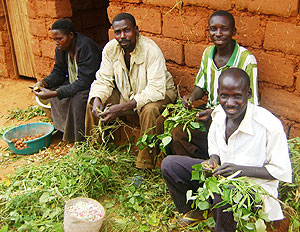In Rwanda, a man in the kitchen is an unusual sight in most places, be it urban or rural. This is often accompanied by sarcastic comments, mocking laughter or shaking of heads in disapproval, from men as well as women. Patriarchy has been a widely accepted social norm; gender roles are clearly divided into how men are supposed to act and how women have to behave. However, in most rural areas in Rwanda all this has started to change and men have miraculously accepted to step foot into the kitchen to cook and serve their children and wives.


In Rwanda, a man in the kitchen is an unusual sight in most places, be it urban or rural. This is often accompanied by sarcastic comments, mocking laughter or shaking of heads in disapproval, from men as well as women.
Patriarchy has been a widely accepted social norm; gender roles are clearly divided into how men are supposed to act and how women have to behave.
However, in most rural areas in Rwanda all this has started to change and men have miraculously accepted to step foot into the kitchen to cook and serve their children and wives.
In the village of Kayonza, a group of men were found preparing beans together with women in the kitchen.
"It is so surprising to see my husband assist me in sorting out beans for cooking.
This has never happened since we were married 32 years ago,” said Gertrude Mukagatare, a 56 year-old resident of Rwinkwavu in Kayonza district.
Jean Damascene Ntabanyurwa is the 60 year- old husband of Mukagatare who has become a role model and earned respect for his change in attitude.
"I was initially ridiculed by other men for doing work traditionally reserved for women,” said Ntabanyurwa, "but I have quickly become a role model, earned respect and courage to do things differently.”
The change in men’s attitude has been due to ongoing sensitizations that encourage men to get actively involved in helping women. In rural areas, they are sensitized against gender stereotypes, understandings of manhood and fatherhood in a more positive way.
Anita Mutesi, the Vice Mayor of Social Affairs in Kayonza district said that though gender stereotypes are present and practiced, the current trend of change in attitude is encouraging.
"We are determined to end gender stereotypes and prejudice. Men’s and women’s roles in society are divided, and as a result, men are often left out of community initiatives, particularly care and the upbringing of children and vice versa.”
Rural women in administration
Hile Jennifer in her book, ‘Stereotypical Naturism: Understanding Discrimination Based on Stereotypes Prejudice,’ noted the impeccable need to understand the nature of stereotypes.
"Understanding the nature of stereotypes, generalizations, prejudice and discrimination is the first step in cultivating tolerance.
Every person has prejudices since, it is simply human nature. People should, however, in the interest of intellectual honesty, consider that fairness is compromised when they discriminate against others because of personal prejudices.”
"Many people believe that every human being deserves respect and freedom to practice unhindered, activities that make life more meaningful for them as long as there is no harm done to others. After all, personal freedom is one of the hallmarks of democracy,” Hile stated.
Rwandan women have been an important and increasingly visible part of the modern Rwandan society. Women are successfully and continuously fighting patriarchy and discriminative male dominance.
Claudette Nyiramasoni is a 38 year-old local leader in Kirehe district who said that through involving a change in attitude and perception, they crossed over the very boundaries which had constructed laedership as a male preserve.
"Our presence in administration and general politics indicates our rejection of the women’s traditional and marginalised status which has been met with resentment and resistance.
Rwanda’s development is bound to change as the society recognizes that women are a driving force that is needed to change the course of this country”.
Men in Child upbringing
The essence of fatherhood is being reconstructed in the society, particularly in rural areas. In Rwanda and most of Sub-Saharan Africa, child care and upbringing is basically a role left for women alone.
The lack of family planning that results in giving birth to many children, has been persistent because only the men were left to decide, on the number of children a woman could bear before she could stop.
"I never had any say about the number of children to produce, yet I endured all the problems associated with poor child spacing,” said Margaret Musaniwabo, a 43 year-old mother with four children in Gatsibo district.
Musaniwabo said that after she and her husband were sensitized to be equal partners in deciding on the spacing and the number of children they could have, his perception changed.
"I now have a break. I feel like a human being with a say on my life…My husband and I, now, discuss family issues together,” Musaniwabo said.
This kind of background is what is essential if men and women want to achieve more control over their fertility.
Jean Marie Muhinda, 37, said, "Since men have come to be involved in child care and upbringing, they understand the importance of producing few children.”
The results are enormous; birth rates are lowered and women are saved from the burden of bearing many children unlike in the past when they used to shoulder child birth and upbringing single handed.
The rural women in Rwanda today say that the trend of events associated in men’s attitudes is slowly changing. That seeing a man go to the kitchen is indeed a miracle, which none of these women expected to see in their lifetime.


